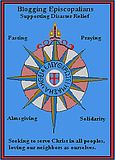Imagining the Messiah Quiet Day 1.5
Before I went to St. Louis I started posting the meditations I gave for the Cathedral ECW Quiet Day last week. I posted the first half of the first meditation (split it up to break up the wordiness). Some of these are notes, not full sentences, so bear with me. I have expanded them in some places where I realized it needed a little filling out.The question I posed was "why do we need our imaginations?"
I've been working in parishes since 1999--over the years I've started to understand that the most important task facing the parish priest, the prophetic part of the calling, is to imagine and envision ways of looking at the tasks of a congregation. It's not that this is exclusive to the priesthood, but I do think it's an integral part of our calling. And the priest offers this to the community as a way of leading those who gather not just to reconsider how to live together in the owrshipping congregation but also to go out to the communities that are part of--the binesses, the clubs, the schools, the families--and find opportunities to exercise prophetic imagination in those arenas.
We've come to associate prophetic preaching with social justice preaching from the liberal side of the fence. Brueggemann was really helpful to me in understanding that prophecy is using one's imagination to connect with God's vision for a community. In his book The Prophetic Imagination, he talks about Moses in the Exodus envisioning an "alternative community." Not one of slaves, but of a people who willingly enter into a covenant relationship wiht God, who take on the keeping of the Law as a way of building a just society in right relationship with each other and with God. Later prophets criticized the culture that developed, the royal culture that replaced marraige with arems, community leadership with taxing districts and bureaucracy, a stnading army which connotes reliance on self and not on God.
In this light, all that bizarre stuff in the prophetic books starts to make sense. The weird language--the use of imaginative language criticizing reality as we have constructed it.
Why are we afraid of imagination? Because imagination can lead us to understand the darkness in humanity and the dangerousness of God. Our willing naivete--"that can't happen here," "people can't do something that bad," leads us to overlook signs of evil in our midst. We find out things about colleagues and friends, and realize the signs were always there, but we shrugged them off. "It's just so-and-so, it's ok."
We don't want to imagine the dark side, how we might have to confront and cope wiht it.
Even on the side of light, imagination can reveal things about God we don't want to know. I have a friend on the Internet (see-through faith over there on the sidebar) who recent read a book called Your God is Not Safe , which reminded me of the wonderful description of Aslan in The Lion, the Witch and the Wardrobe. God's imagination takes us to all sorts of places that are not safe, if we choose to follow.
Let me sum by telling you a little about my journey in faith. I grew up in an AngloCatholic parish on the North Side of Chicago--if the term biretta belt means anything to you, that's where I was. And I had two different faith experiences growing up--the rhythm of the liturgical year, which was wonderful and life-giving, and is a bedrock part of my faith formation, and hte life of the congregation itself, which was pretty dead, holding on against change and even, sometimes, laughter. I wanted more. I wanted more from God. I wanted to be more connected.
I was fortunate to stay connected with the church in college, but it was in graduate school that the real opening up of my faith began. Because I was in a church that was very much alive. We talked about our faith. And my life wasn't going so well--the drive I had to be a curator in a museum didn't seem to inspire me that way I thought it would. And I took EFM (Education for Ministry, a four year study program for laity), and started really studying scripture for the first time in my life.
And on Sunday--I was sitting in the subdeacon's chair during Sunday service, and listening to some one read from Ezekiel. And it was like I heard and understood Scripture for the first time. And I literally had an experience of something being lifted from my eyes. Of being able to see things I had never seen before. And then I started to noticed on Sundays, when I was a chalice bearer, it was like I was seeing people in a way I didn't see them the rest of the time. There was one woman who didn't like me--her son was in my youth group, and I think she didn't like that we had a good relationship, and she kind of irritated me, too--but when I gave her the chalice I realized I didn't think of her that way. And the only way I can describe that experience is that on Sundays at the altar, for a brief moment, I get a glimpse of people the way God sees them, the way God holds them in the divine imagination.
That experience fills me in a way no Spiritually Themed Product ever could.
One of the gifts we have of our Anglican heritage is that we have a tradition of theological imagination. Julian of Norwich (who I claim as Anglican even if she does predate the Reformation), to the imaginative language of Cranmer which permeates our worship, to the poetry of George Herbert, the alternative community envisioned by Deacon Nicholas Ferrar at Little Gidding in England. Using the imagination, especially in language, is in our religious DNA.
So here are some question to ponder:
What keeps you from being imaginative? What gets in your way?
What ways of imagination are easiest for you? Is it with language, or visual arts, or something else?
What kinds of ways of imaginative work have you always longed to do?
How have you experienced the divine imagination?

























5 Comments:
I'm having such issues with Blogger--I can't tell you how many times I've tried to respond to your lovely comment.
You have been such a blessing to me these past few months, and your enthusiasm for your writing has encouraged me.
Using the imagination, especially in language, is in our religious DNA.
What an excellent metaphor, and how wonderfully said!
And what a great post you've written here, Emily. I've had the "veil lifting" experience, too, you know - but I don't think it was momentary like yours. More of an "educational" variety, over time. In any case, my outlook has changed a great deal.
Thanks for the questions to ponder. I will, and you remind me that I was supposed to publish my faith story. I did write it, you know, but it came out so long....
This is really wonderful, Emily. Thanks again.
Andrew Greeley has explored the idea of religious or sacred imagination (not sure I have his term or just my memory of something close) in some of his nonfiction writing. He writes from his rootedness in and understanding of Celtic Catholic Christianity. I ate it up some years ago, and surely the Celtic and the Catholic meet in Anglican/Episcopalian Christianity as well!
Imagination and the nonverbal are really important to me, in huge contrast to my many years of placing highest value on what is written and spoken. Now, the sacramental nurtures my faith in inexpressible ways I could not imagine when I was young and not churched! I'm trying not to write the longest comment you've ever received (!), but this kind of stuff is very meaningful to me at a gut level.
I find that old images get in my way – especially those based on the authority of the church. On the night before I attended this Quiet Day I was studying and reading “On the Use of the Lord's Image” as below:
Here we touch upon a point of real interest. The use of the Lord's image is frequently of vital importance, but—and it is here that I seek to lay the emphasis—it must be the image arrived at by oneself through the medium of the expansion of the Christ consciousness in one's own life, and by arriving at the stage of conscious discipleship. . .
Why, think you, is there no good and true picture of the Blessed One, There are only a few speculations by the devotees of the early church and none by those who knew Him. The reason is a definite one. There is no true image of Him because it must be upon our hearts and not upon our canvases. We arrive at knowledge of Him because He is ours, as we are His. Do you understand that whereof I speak? He is the world Healer and Saviour. He works because He is the embodied soul of all Reality.
Bailey, Alice A. 1981; 1953. Esoteric Healing. New York: Lucis Publishing, 360.
During the Quiet Day, I used the questions she posed to us and my earlier reading and thinking to let the Image of the Christ come from within my heart. The Blessed One who is known to each of us in this way so we can freely approach the Divine.
What is easy for me is the ecstasy of mysticism to build a constant awareness of the Christ in the world. Influenced by Pierre Teilhard de Chardin’s The Divine Milieu and other works.
What is hard for me is to not rush the process of the new reality. I am so eager for the Return of the Christ and Advent is always here in the Eternal Now.
I prefer to use my imagination to create liturgy without the restrictions of our faith.
Emily+, did you post about your Meditation 3 and the poem from Christina Rossetti?
I think this is the one you used – Christina Rossetti (1830-1894). A Better Resurrection.
Her Love came down at Christmas is also appropriate to this time.
Love came down at Christmas,
Love all lovely, Love divine;
Love was born at Christmas,
Star and angels gave the sign.
Worship we the Godhead,
Love incarnate, Love divine;
Worship we our Jesus:
But wherewith for sacred sign?
Love shall be our token,
Love shall be yours and love be mine,
Love to God and all men,
Love for plea and gift and sign.
bls--thanks. I understand about the over time bit, too. I look forward to reading your faith story.
Barbara--I'm not surprised about Greeley, I really need to look more into his nonfiction (I read a lot of his mysteries in one of my mystery-inhaling moments).
Kathleen--Thanks for sharing that quote and the Rossetti poem--I'd forgotten that she was the author of the words for that hymn.
I plan to post the notes from Meditation 3 sometime today.
Post a Comment
<< Home